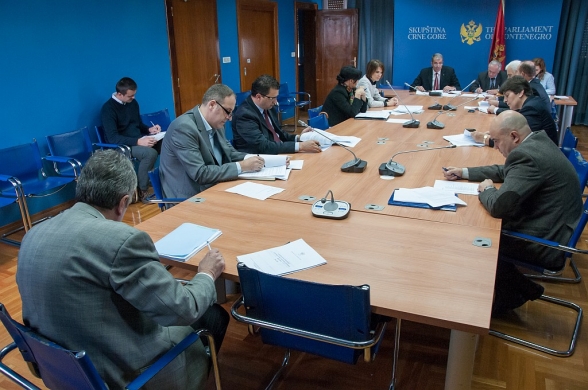1. Employment of foreign labour force and possibility of greater employment of domestic labour force.
Employment policy in Montenegro is based on the National Strategy for Employment and Development of Human Resources 2012 -2015. The Strategy was distributed to the members of the Committee.
The meeting was attended by the Assistant to the Minister of Labour and Social Welfare, Ms Arijana Nikolić – Vučinić. She pointed out that this field was regulated by the Law on Employment and Exercising Rights with respect to Unemployment Insurance and the Law on Employment and Work of Foreigners. This field is covered by two Chapters in Montenegro’s accession process to the EU: Chapter II – Freedom of Movement for Workers and Chapter XIX – Social Policy and Employment. One of priorities of the Government of Montenegro is increasing the employment and decreasing the unemployment rate. The Assistant to the Minister said that in order to perceive the movements in the labour market relating to both domestic labour force and the issued work permits, the following analyses had been adopted this year:
- Analysis of possibility of greater employment of domestic labour force in relation to the existing scope of employment of foreigners;
- Analysis of the need for labour force during the tourist season;
- Information on movement in the labour market and measures for increase of employment;
- Information on the Need to Increase the Number of Work Permits for Foreigners in 2013 with the Proposal for a Decision on Determining the Number of Work Permits for Foreigners for 2013
In 2013, until 5 November, a total of 19,901 work permits have been issued. Out of this number, 16,118 are permits issued within the determined quota, and 3,783 outside the quota, in accordance with Article 7 of the Law on Employment and Work of Foreigners.
The topics also included the following: unemployment in Montenegro; unemployment in the region; unemployment in the EU; Programme for Stimulating Entrepreneurship; Law on Professional Training, active politics of employment; employment and work of foreigners; on the level of education of people to whom work permits were issued.
The following participated in the discussion: Mr Zoran Jelić, the Chairperson of the Committee, and the MPs: Mr Goran Tuponja, Mr Andrija Popović, Ms Zorica Kovačević, Mr Izet Bralić, Mr Neven Gošović and Mr Halil Duković, members of the Committee.
Following the discussion, the following conclusions have been adopted:
1. Monitoring of enforcement and implementation of the National Strategy for Employment and Human Resources Development 2012-2015;
2. Monitoring of enforcement and implementation of the Law on Employment and Exercising Rights with respect to Unemployment Insurance and the Law on Employment and Work of Foreigners;
3. Submitting of a report by the Ministry of Labour and Social Welfare on the number of employed foreigners during the year as seasonal labour force and the employment of domestic labour force, as well as submitting of a Report on Regional Change in the State of Poverty and Unemployment in Montenegro;
4. Continuous monitoring of implementation of recommendation of the Government of Montenegro in order to perceive the movements in the labour market relating to both domestic labour force and the issued work permits in the current year.
Minutes from the eighteenth meeting and the joint meeting of the Committee on Health, Labour and Social Welfare, the Committee on Education, Science, Culture and Sports, the Gender Equality Committee, and the Committee on Human Rights were adopted unanimously, without objections.









